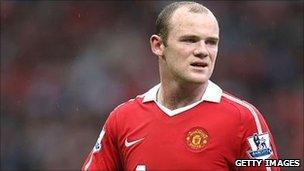Athletes attacked for smoking habits
- Published

England and Manchester United's Wayne Rooney is one of the sport's most high-profile young stars
When footballer Wayne Rooney was spotted having a cigarette on several occasions during his break between the World Cup and the start of the Premier League season, there was outrage.
As a top-flight footballer, he is expected to treat his body with respect at all times, even during the close season.
Rooney is not alone. Other athletes including footballer Zinedine Zidane and basketball player Michael Jordan have all been photographed smoking.
But should they be setting a better example?
Athletic heroes
Around 6% of 11-to-15 year-old pupils admit to being regular smokers, and statistics show those who start smoking before 16 find the habit hardest to break.
Jean King, director of tobacco control at Cancer Research UK, said athletes, particularly footballers, are seen as heroes and that this status means they also need to be positive role models.
"Young people are very taken with sport and there is a link with it and glamour," she said.
"Some young people will start smoking because they have seen their hero smoking."
Anna Gilmore, professor of public health at the University of Bath, agreed that athletes have a responsibility to their fan base to be "responsible role modes".
"We know that children are greatly influenced by the people around them - children growing up with parents or siblings who smoke are 90% more likely to become smokers.
"We also know that tobacco sponsorship of sport influences children's smoking. So any negative role modelling, including that by sports stars, could have a detrimental effect."
Health impact
But she said athletes should also be thinking of the effect that smoking is having on their own health and performance.
"Smoking has a very detrimental effect on health and would affect one's ability to function as an athlete," she said.

Young people are influenced to smoke by their heroes
"It has significant impacts on the cardiovascular and respiratory systems, which are essential to athletic performance."
By smoking regularly, athletes - among others - face a decrease in lung function, which is vital for exercise as stamina and performance are affected as the body gets inadequate oxygen.
Smokers also tend to suffer from shortness of breath more often than non-smokers, as their muscles and heart demand more oxygen than their lungs are able to supply.
Smoking also has its effect on heart and circulatory health and can even reduce the ability to recover from injury.
Peer pressure
But Simon Clark, director of the smokers' lobby group Forest, said blaming high-profile athletes for youth smoking rates was misplaced.
"Research suggests that it is mainly peer pressure and the influence of family members that encourages young people to smoke," he said.
"Pictures of celebrities or athletes smoking have relatively little impact.
"The responsibility for young people smoking lies primarily with those who supply tobacco to underage users. We should crack down on them and leave people like Wayne Rooney alone.
"Rooney and other high-profile athletes are adults. They are entitled to smoke without being targeted by the finger-waggers' alliance."
Amanda Amos, professor of health promotion at University of Edinburgh, stressed though that it is documented that role models do play their part in encouraging smoking.
"Role models in the media also have an influence. Several studies have shown that exposure to smoking images in films increases the risks of young people becoming smokers.
"It is also likely that other media images of 'heroes' smoking are likely to be influential such as in magazines, TV and the internet.
"In research that I have done with young people they have no problem in citing celebrities that they know who smoke.
"I think that over the past few years some sections of the media, such as young women's magazines, and some celebrities have become more aware of their possible influence.
"These mags, but not others, now rarely show positive images of smoking and certain celebrities seem to avoid being photographed smoking.
"However, positive images of smoking celebrities are still widespread in the media."
- Published9 June 2010
- Published31 August 2010